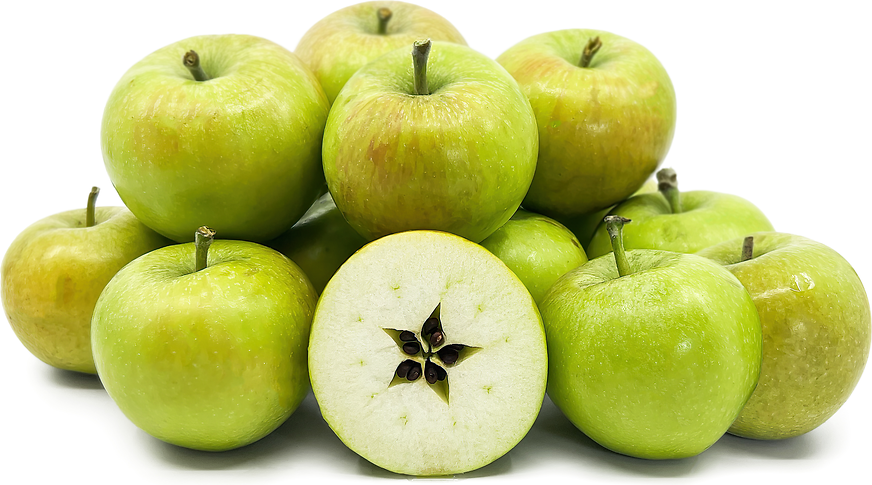


Upton Pyne Apples
Estimated Inventory, lb : 0
Description/Taste
Upton Pyne apples are oblong to conical fruits with a slightly ribbed, elongated appearance. The skin is smooth, dry, and firm with a yellow-green base, covered in red-pink striping, and brown russeting may appear in the cavity surrounding the stem. Underneath the surface, the flesh is aqueous, crisp, semi-coarse, and white, encasing a central core filled with small, black-brown seeds. Upton Pyne apples are aromatic and have a sweet, slightly acidic flavor with subtle notes of pineapple.
Seasons/Availability
Upton Pyne apples are available in the winter through early spring.
Current Facts
Upton Pyne apples, botanically classified as Malus domestica, are a late-season variety that belongs to the Rosaceae family. The sweet-tart fruits are considered to be a dual-purpose apple, utilized for both fresh and cooked applications, and are named after their breeder’s last name, Pyne, and his hometown of Upton, England. Upton Pyne apples are a specialty variety that is not commercially cultivated and is found through select growers in the United Kingdom. The apples are selected by apple enthusiasts for their unusual, slightly tropical flavor and are commonly used by home chefs for purees.
Nutritional Value
Upton Pyne apples are a good source of vitamin C, which is an antioxidant that can help increase collagen production and boost the immune system. The apples also contain fiber, which can help regulate the digestive tract and provide some potassium, vitamin A, iron, and calcium.
Applications
Upton Pyne apples are best suited for both raw and cooked applications such as baking and boiling. The fruit can be consumed fresh, out-of-hand, sliced and displayed on appetizer plates, dipped in caramel as a dessert, or chopped and tossed into fruit and green salads. The apples can also be cooked and blended into applesauce and apple butter, minced into ground meats, sliced and fried into fritters, or baked into tarts, muffins, pies, crumbles, and cakes. Upton Pyne apples are primarily known for making a smooth apple puree. This sauce can be consumed as a stand-alone snack with spices, or it can be swirled into yogurt or oatmeal, mixed into pancake batter, blended into smoothies, and used as an egg substitute in some baking recipes. Upton Pyne apples pair well with bananas, dates, avocadoes, blueberries, carrots, squash, cabbage, caramelized onions, meats such as pork, beef, and poultry, and swiss cheese. The fresh fruits will keep 1-3 months when stored in a cool, dry, and dark place such as the refrigerator.
Ethnic/Cultural Info
In England, many apple varieties gain notoriety and increase in popularity through exposure at events created by the Royal Horticultural Society (RHS). Headquartered in London, the RHS was established in 1804 as a gardening non-profit and is an active organization that hosts a variety of yearly floral shows, exhibitions, and educational events to encourage gardening. Upton Pyne apples were given their own display during an RHS exhibition in 1933 as a way to showcase and bring awareness to the variety. In the modern-day, the events have become so popular that the society even had their own show halls built in the early 20th century to host the exhibitions. Known as Lindley Hall and Lawrence Hall, the event spaces have been recognized for their unusual architecture and also host many other high-profile events such as fashion shows, weddings, and art exhibitions.
Geography/History
Upton Pyne apples were created by nurseryman George Pyne at Denver Nurseries in the county of Devon, England. While the parent breeds of the variety are unknown, the cultivar was released to the market in 1910 and saw limited success. Today Upton Pyne apples are a specialty apple that is cultivated through select growers across the United Kingdom and are commonly found at local farmer’s markets. The variety is also available through nurseries and online catalogs for home garden use.




